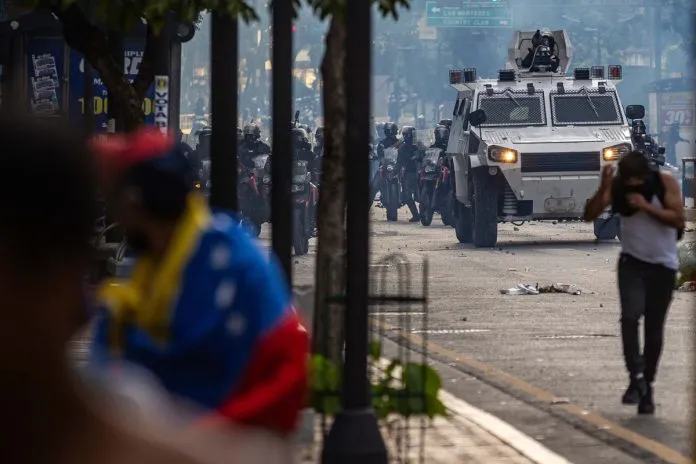The Emergence of Diplomatic Pressure on Venezuela
As Venezuela woke up on a Monday morning to the official announcement from the National Electoral Council (CNE) declaring Nicolás Maduro as the victor of the recent presidential election, the country faced a growing storm of international scrutiny and diplomatic tension. Maduro’s reported win with 5.15 million votes, or 51.2%, over his primary opponent, Edmundo González Urrutia, who garnered 4.45 million votes, or 44.2%, ignited a wave of reactions both within Venezuela and globally.
Official Declaration and Immediate Reactions
In a formal declaration at the CNE headquarters, Elvis Amoroso, the president of the CNE, proclaimed Nicolás Maduro as the winner. However, this announcement was met with skepticism and concern due to significant issues related to the verification of electoral records. Opposition groups highlighted the fact that they had not received a majority of the electoral records and claimed they had evidence showing victories in 73% of the records. The lack of transparency prompted calls from the international community for a thorough recount.
International Reactions and Diplomatic Isolation
The election results and the subsequent handling of the situation have sparked a range of diplomatic reactions. Several countries, including the United States, Argentina, Chile, Peru, Guatemala, and Costa Rica, have not recognized Maduro’s reelection. These nations have questioned the transparency and legitimacy of the electoral process, labeling it as fraudulent and arguing that it does not reflect the true will of the Venezuelan people.
The United Nations also demanded “total transparency” in the vote counting process. Meanwhile, the Carter Center, an American organization invited to observe the elections, urged the CNE to release the voting records immediately.
Panamanian President José Raúl Mulino took a more drastic step by withdrawing diplomatic staff from Caracas and suspending diplomatic relations. He also anticipated a rise in Venezuelan migrants crossing the perilous Darién jungle towards the United States. To date, over 200,000 individuals have undertaken this dangerous journey, with two-thirds being Venezuelans. Mulino expressed concerns about the increasing flow of Venezuelan migrants and emphasized the need for measures to safeguard their lives and facilitate their migration.
The Role of Colombia and Brazil
Colombia and Brazil have emerged as key players in this complex situation. Both nations, along with Mexico, were deliberating a joint response. Colombian President Gustavo Petro and Brazilian President Luiz Inácio Lula da Silva have taken a cautious approach. They are among the few leaders who maintain some level of constructive communication with Maduro’s government. This position is significant because they are two left-leaning leaders who engage with the chavismo from a perspective of ideological affinity.
Diplomatic Stance and Future Prospects
According to Mariano de Alba, an analyst, the stance of Petro and Lula is crucial due to their unique position of maintaining dialogue with the Venezuelan government while simultaneously addressing the situation from a leftist perspective. Their approach could influence the overall dynamics of Venezuela’s international relations and the future of its diplomatic engagements.
The analyst Txomin Las Heras Leizaola suggests that while Brazil and Colombia’s initial reactions have been cautious, they are expected to clarify their positions fully. This cautious approach indicates a lack of automatic solidarity with Maduro’s government and a wait-and-see attitude as the situation evolves.
Theodore Kahn, Director at Control Risks, highlights that Colombia’s approach is pragmatic given its shared interests with Venezuela in terms of political and social developments. Both countries are likely to continue using diplomatic channels to engage with Venezuela before making more definitive statements.
The Role of Opposition and Transparency Concerns
From the perspective of Venezuelan opposition figures, the situation remains fraught with challenges. María Corina Machado, a leading opposition figure, stated that they have the means to verify the election results and are preparing to publish all available records online. This initiative aims to provide transparency and allow Venezuelans and the international community to cross-check the results. The opposition’s commitment to this process could potentially create a counter-narrative to the CNE’s announcement and could impact the legitimacy of the results.
International Support and Reactions
Meanwhile, countries such as China, Russia, Syria, Cuba, Nicaragua, Honduras, and Bolivia have congratulated Nicolás Maduro. Venezuelan Foreign Minister Yvan Gil communicated Maduro’s commitment to strengthening ties and cooperation with these nations, reinforcing the international support that Maduro’s government enjoys despite widespread criticism.
Summary and Implications
The diplomatic pressure from Colombia and Brazil, coupled with the broader international response, plays a crucial role in shaping Venezuela’s current political landscape. The reactions of these countries, along with the efforts of the opposition to ensure transparency and the response of various international actors, will likely influence the future of Venezuela’s political stability and its international relations.
For more updates and in-depth analysis on Latin American affairs, visit our Latin America section.


